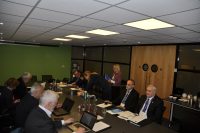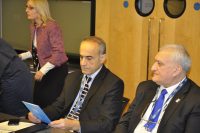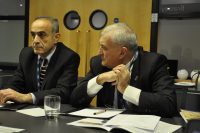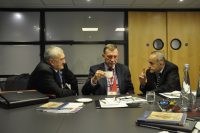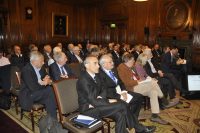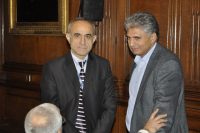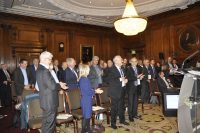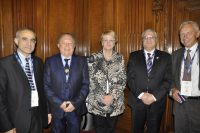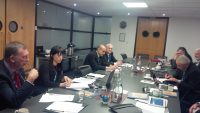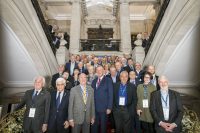On October 22-26, 2018 the Great Forum was held in London
On October 22-26, 2018 the Great Forum was held in London – the capital of Great Britain and was dedicated to Global Engineering Congress and the 68th ECCE general meeting which took place concurrently. The Forum was hosted by the Institute of Civil Engineers (ICE) allocated in 1 Great George street Westminster London SW1P 3AA.
The activities and results of ECCE as well as of USA and UK Civil Engineers Councils were discussed at the meeting.
The information about the Georgian Council of Civil engineers was provided by its president Mr. Iuri Svanidze and the Head of GTU Department of Hydro-Engineering, Prof. Mirian Kalabegishvili.
It should be noted that Mr. I. Svanidze, who is widely known in various international organizations, was proposed to become the president of Civil Engineers Council of Asian countries. The consideration and adopting of this issue will take place next year at the planned Forum in Portugal.
The results of the 2nd International Conference held in Georgia in 2018 on the “Problems of Seismicity with regard to the Monuments of Cultural Inheritance and in Civil Engineering” were also considered in the course of the meeting.
At the meeting the professor Mirian Kalabegishvili gave vast information about the structure of Construction faculty of GTU and about the educational and scientific process performed there. The entry of Georgian Society of Civil Engineers into the European and World Federation of Engineers and the issues of further cooperation enhancement were also planned. The involvement of Georgian Technical University into this Union will facilitate the modern technologies introduction into the engineering matter. In this regard the formal letter from the executive director regarding the entry of the Technical University into the mentioned organization has already been received.
The relevant issues of the engineering were discussed at the meeting, among them the problems of seismicity and energy-efficiency. It has been noted that in many countries of EU the majority of the existing constructions seismically are less sustainable and their energy-efficiency is low. Taking into consideration the fact that in some areas the buildings are subject to seismological pressure (stress) and high temperature changes, it becomes indispensable to increase the process of constructions rehabilitation or their further modernization. Presumably, these measures: will improve the sustainability of the constructions, are economically favorable, will reduce operational costs, will facilitate the sustainability of the environment and the society and will propose and provide the population with save buildings.
Today’s practice determines and facilitates the development of deficiency grading and offers on particular spots the energy-efficiency improvement or constructive seismic updating. The walls of the constructions can be insulated, but their basic construction matters remain hidden and may become dangerous for life, especially if the areas are seismologically active. The EU energetic renovations and repair costs should be taken into consideration. Though, the economic risk is exaggerated more, than the potential damage and life loss. In this regard with the growth of awareness, it is urgent to draw funds necessary for the rehabilitation of the buildings and infrastructure. The necessity to conduct such activities is maintained by the recent earthquakes in Turkey, Italy, Greece, Slovenia and Cyprus.
It has been noted that our objective is to present simple comprehensive engineering solutions, aimed at engineering practice, which inquires the necessity of constructionally renovated structures building when the energy renovation is needed. In order to solve the safety problems of the existing constructions the awareness should be increased. Six basic requirements regarding the safety matters of the structures (which building is considered to be safe) are recorded in Euro-Code. Among them are: the sound insulation and general safety. When we get all the data formally, it will enable us to submit the document to ECF in Brussels as well as to the EU Commissioner, expert engineers and various organizations.
It is necessary to find the way to the EU financing in order to assess, strengthen and rehabilitate the constructions as well as their energy-efficiency. The decision makers should take into consideration the great responsibility they bear. Not only while implementing energy-efficiency measures but considering the general safety. There is a new tendency: “Rational financing for the rational buildings” but the building may be called rational if it is safe and protected.
The place of project commencement may become the State/Governmental buildings and the constructions of great importance (in accordance with the categories of the euro- code), as well as the concentrated buildings or those which are utilized by a lot of people. Later when this approach will be published and will become known and accepted by the wide circles, it may become possible to continue the second part/second approach, which is more scientific and academic. In particular:
-
studying the level of the buildings’ security;
-
defining the target level criteria and material suitable for the seismic safety of the buildings and their energy-efficiency.
-
determining both innovative and traditional materials that will enable to technically ensure the seismic and energy renovation of the given buildings by means of these methods unification;
-
with regard to this matter determining and asses the existing situation in the countries of EU and find out if they have any special policy carried out or special principles to be followed.
